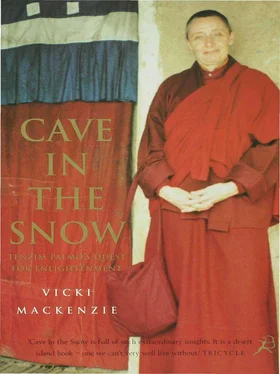Tshering Dorje had his own view on Saab Chomo: ’She used to come to my house for a few days in the summer when she was not in strict retreat and join in the family activities. I remember her as always laughing and kind-hearted. She wanted to give everything away, but of course she had so little. She only wanted to talk about Buddhism, nothing else. She was always very strict about dharma matters. I think of her not as holy, but hallowed, because of her practice and her karma. I believe her past life exerted an extremely strong influence on this present one. Sometimes I used to compare her with Alexandra David-Neel,’ he said, referring to the renowned Frenchwoman who, earlier this century, disguised herself as a man and smuggled herself into Tibet when it was banned to outsiders. She wrote about ’the magic and mystery’of ’the forbidden country’, whetting the public’s appetite for the ancient, esoteric wisdom which Tibet contained. She even took the title ‘lama’.
‘I went through all David-Neel’s books looking for similarities,’Tsering Dorje continued. ‘Both were brave, women, adventurers and drawn to Tibetan Buddhism. But Tenzin Palmo was much deeper into the spiritual path than Alexandra David-Neel. When she went to live in the cave I used to worry about her greatly. She is not a strong woman, although her willpower is stronger than any man’s.’
Tenzin Palmo now entered an extremely pleasant phase of her life. She was content at last. Finally she was left alone to practise. The long snow-bound winter months provided the most perfect opportunity to enter prolonged retreat – the absolutely necessary prerequisite for spiritual advancement. That was what she intended. Her dedication, however, was not shared by the rest of the community.
‘You will need eighteen cups and plates,’ instructed an old nun who greeted her on her arrival.
‘Whatever for?’ asked Tenzin Palmo, puzzled.
‘You see, dear, in the winter we all get together and have dinner parties. There are eighteen of us so when we come to your house you’ll need eighteen cups and plates,’ the nun replied.
‘Well, for one thing if anyone comes they can bring their own eating utensils, and for another I’m intending to spend the winter meditating,’ responded the Western convert, single-minded and forthright as ever. She proceeded to do just that, following the prescribed meditational practices advised by Khamtrul Rinpoche that would provide the essential foundation for the long retreats that were to follow in the cave. Much of them consisted of the ‘Preliminary Practices’ – a series of ritual acts such as performing prostrations, and making mandala offerings, which had to be done literally hundreds of thousands of times. Such repetition was said to be necessary to make the mind pliable for the more complex and esoteric meditations which were to follow. She did them diligently, as well as studying the sacred texts and refining her knowledge of the Buddhist canon. Here, in Lahoul, with no one speaking English, her Tibetan took a quantum leap.
During the summer and autumn months she rested and prepared for winter – gathering fuel and getting in stocks to see her through the long, cold months ahead. Now she allowed herself fun, sociability and a certain amount of bingeing: ‘In the autumn, after the harvest, there was a special period when we did the traditional alms rounds in the surrounding villages,’ she recalled. ‘You go to each house. Outside you say a blessing prayer and then someone leans out and calls you in. They get out their best carpet, their best china and silver and lay it out on their special little Tibetan tables. You’d go in and sit down and recite the best loved prayers such as the Twenty-one Praises to Tara – to bring them blessings and protection. They’d give you salt tea, sweet tea and their home-brewed bean chang to drink. If there was any food they’d give that too. Then they told you all the local gossip. After that they’d put barley grain and vegetables into the sack you were carrying.
’Then you’d go to the next house and the next. When you first started it was great. You’d have been walking for an hour or two through the pre-dawn and you’d be numb with the cold by the time you got to the first house. The hot tea they offered was wonderful. But by the end of the day the sack and the stomach is getting bigger and bigger, and you’re feeling completely nauseous and you beg them not to give you any more. But the villagers really loved it. At the end of it all you had about fifty to eighty kilos of barley. It was more than enough for me,’ she said. The process didn’t stop there. After amassing the barley, Tenzin Palmo had to get it roasted before going to the local mill to grind it into flour, ready for it to be mixed with tea and rolled into balls to make the ubiquitous tsampa, staple food of all Tibetans. Tenzin Palmo developed a genuine taste for it.
Life went on in this manner for six years. Occasionally she ventured out of her valley. Every year during the summer she went back to Tashi Jong to see Khamtrul Rinpoche, to report on her spiritual progress and to receive further instruction. It was imperative. The guru was the guide who, knowing his disciple’s mind more intimately than anyone else on earth, could steer her course and tailor-make her path to ensure maximum progress towards Enlightenment in her lifetime.
Once, in 1973, she made her way back to England to see her mother. It was her first visit to her homeland in ten years, and was to prove an eye-opener. Lee had moved from Bethnal Green to fashionable Knightsbridge, in the heart of London’s West End, where she had taken a job as housekeeper to a wealthy Canadian who had an opulent apartment there. From living in a little stone house and fetching her own water, Tenzin Palmo now found herself just a few steps away from Harrods, the exclusive department store, and from the manicured splendour of Hyde Park, steeped in luxury. She had a soft bed to sleep in, wall-to-wall carpets, central heating, two colour television sets, and every modern convenience Western civilization had thought of. Far from revelling in the unaccustomed comfort as one might expect, she hated it.
‘I was so bored. The London water I found undrinkable. I had to drink fruit juices all the time, I couldn’t even drink tea. It made me sick. The food was so rich it made my head feel as if it was stuffed with black cotton wool. I got electric shocks from everything I touched and I felt tired all the time. “If ever you think that happiness depends on external factors, remember this,” I told myself.’
Finding absolutely nothing in her former life to attract her, she was eager to get back to her stone house in Lahoul, but there was a problem. She did not have the plane fare back. As was so often the case, she was completely out of cash. Over the years Tenzin Palmo had developed an interesting, if highly unusual relationship with money. Like all religious in the Tibetan Buddhist tradition, she was not funded by a common fund or central government body – being left to her own devices to find a living allowance. As such she was at the mercy of whatever people found it in their hearts to offer her. Since she made it a personal policy never to ask, this frequently made for a precarious and astonishingly lean existence indeed. With remarkable equanimity she learnt to let go – and somehow managed to survive.
‘From time to time people would give, usually small amounts,’ she explained. ‘For the first few years when I was a nun in Dalhousie my mother sent me a month. Sometimes that managed to feed two of us. A couple of rupees would get you a plate of rice and dhal (lentils), which is what I lived on. The most expensive item was milk powder for tea. Everything could be bought in small amounts according to your need. When I went back to London I was staggered when I went to buy butter being asked if I wanted New Zealand, Australian, Devon, Danish, salted, unsalted. The choice and quantities were so enormous!’
Читать дальше












